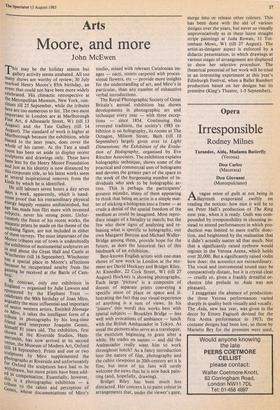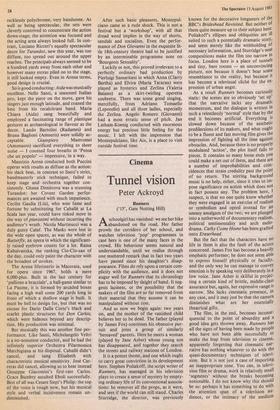Opera Irresponsible
Rodney Milnes
Don Giovanni (Montepulciano)
Avague sense of guilt at not being in Bayreuth evaporated swiftly on reading the notices: how nice it will be to see Peter Hall's production of The Ring next year, when it is ready. Guilt was com- pounded by irresponsibility in choosing in- stead to attend performances in which pro- duction was limited to mere traffic direc- tion, and heightened by the realisation that it didn't actually matter all that much. Not that a significantly raised eyebrow would register in the Verona Arena, which holds over 20,000. But a significantly raised violin bow does: the acoustics are extraordinary. The vocal and instrumental sound may be comparatively distant, but it is crystal clear — cruelly so, given a frankly dreadful or- chestra (the prelude to Aida was not pleasant).
I exaggerate the absence of production: the three Verona performances varied sharply in quality both visually and vocally. The Aida, new last year, was given in the decor by Ettore Fagiuoli devised for the first Arena performance in 1913; the costume designs had been lost, so those by Mariette Bey for the premiere were used, recklessly polychrome, very handsome. As well as being spectacular, the sets were cleverly contrived to concentrate the action down-stage; the attention was focused and the acting area always looked full. In con- trast, Luciano Ricceri's equally spectacular decor for Turandot, new this year, was too diffuse, too spread out around the upper reaches. The principals always seemed to be a hundred yards away from each other and however many extras piled on to the stage, it still looked empty. Even in Arena terms, good design is crucial.
So is good conducting: Aida was musically excellent. Nello Santi, a seasoned Italian pro, kept the piece on the move, gave his singers just enough latitude, and coaxed the best from his recalcitrant band. Maria Chiara (Aida) sang beautifully and employed a fascinating range of plastique gestures as archaeological in flavour as the decor. Lando Bartolini (Radames) and Bruna Baglioni (Amneris) were solidly ac-
ceptable. Giampiero Mastromei (Amonasro) sacrificed everything to sheer noise — I counted four breaths in 'Pensa the un popolo' — impressive, in a way.
Maurizio Arena conducted both Puccini operas with results as diffuse as the action: his slack beat, in contrast to Santi's strict, bandmasterly stick technique, failed to keep stage and orchestra together con- sistently. Ghena Dimitrova was a stunning Turandot: her Covent Garden perfor- mances are awaited with much impatience. Cecilia Gasdia (Lift), who won fame and fortune by substituting for Caballe at La Scala last year, could have risked more in the way of pianissimi without incurring the audience's wrath. Nicola Martinucci was a duly gutsy Calaf. The Masks were lost in the wide open spaces, as was the whole of Butterfly, an opera in which the significant- ly raised eyebrow counts for a lot. Raina Kabaivanska, the ranking Cio-Cio-san of the day, could only paint the character with the broadest of strokes.
The Arena Sferisterio in Macerata, used for opera since 1967, holds a mere 6,000-plus. Built in the last century for 'pallione a bracciale', a ball-game similar to La Paume, it is formed by arcaded boxes facing a high wall some 200 yards long in front of which a shallow stage is built. It
must be hell to design for, but that was no excuse for Dario Dalla Corte's black and scarlet plastic structures for Don Carlos, which were hideous beyond any descrip- tion. His production was minimal.
But musically this was another fine per- formance. Like Santi, Michelangelo Veltri is a no-nonsense conductor, and he had the infinitely superior Orchestra Filarmonica Marchigiana at his disposal. Caballe didn't cancel, and sang Elisabeth with characteristic musical sensitivity. Jose Car- reras did cancel, allowing us to hear instead Giuseppe Giacomini's first-rate Carlos.
Grace Bumbry assulted Eboli successfully. Best of all was Cesare Siepi's Philip: the top of the voice is rough now, but his musical style and verbal incisiveness remain un- diminished.
After such basic pleasures, Montepul- ciano came as a rude shock. This is not a festival but a 'workshop', with all that dread word implies in the way of shorts, sandals and socialism. Even the perfor- mance of Don Giovanni in the exquisite lit- tle 18th-century theatre had to be justified by an interminable programme note on 'Bourgeois Sexuality'.
Luckily or not, this proved irrelevant to a perfectly ordinary bad production by Pierluigi Samaritani in which Anna (Clarry Bartha) and Elvira (Maria Tararan) were played as hysterics and Zerlina (Valeria Baiano) as a skirt-twirling operetta soubrette. There was some good singing, mercifully, from Adriano Tomaello (Leporello) and all three ladies, especially the Zerlina. Angelo Romero (Giovanni) had a most erratic sense of pitch. Jan Latham-Koenig conducted with enormous energy but precious little feeling for the music. I left with the impression that Montepulciano, like Aix, is a place to visit outside festival time.







































 Previous page
Previous page